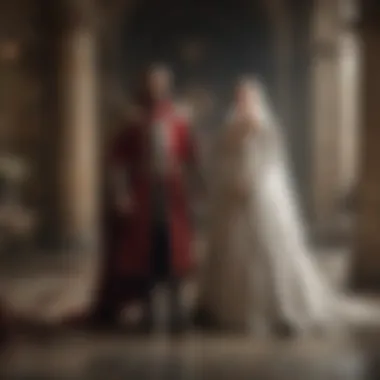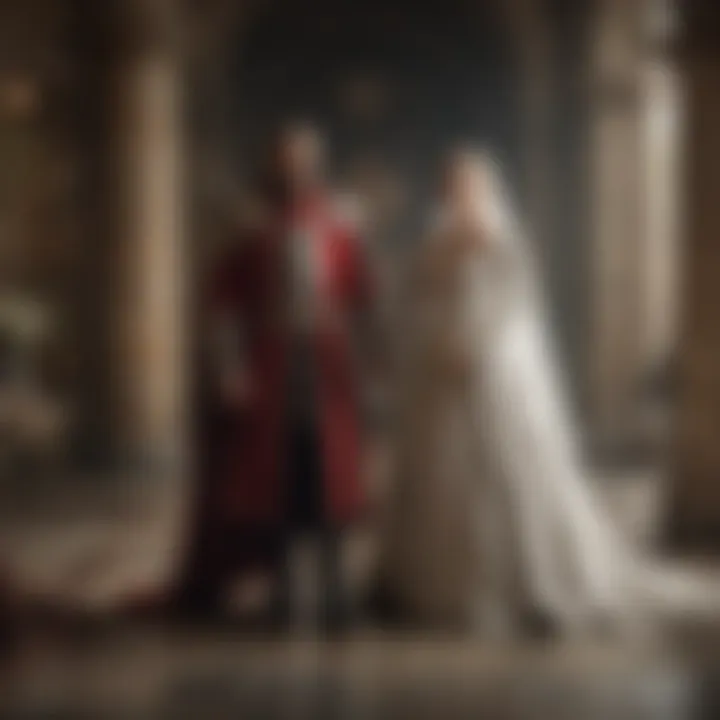The Path to the Title of Lady in Westeros


Intro
In the sprawling canvas of Westeros, where honor and bloodlines paint the landscape of power, the title of Lady holds a significant place. More than just a term of respect, the title embodies a complex web of societal expectations, obligations, and prestige. It represents a person's position in the lofty echelons of the noble hierarchy, which is intertwined with both privilege and peril. Understanding how individuals can ascend to this noble title involves sifting through a rich tapestry of history, culture, and personal ambition. Can one truly call themselves a Lady through sheer will, or is it solely tied to lineage?
From marriage to birthright, the pathway to this prestigious title is fraught with challenges and opportunities. Each key player in this game—a mother seeking to elevate her child’s standing, a lord in search of a worthy bride, or a commoner maneuvering through the intricate social systems—has their own motivations and strategies.
This exploration assists ardent fans, those deeply invested in the intricate plot lines of Game of Thrones, in dissecting the meaning behind Lady status and its implications. With diverse routes leading to this distinction, our journey will take us through character dissections, episodes that carve the narrative, and the rich lore that adds depth to the understanding of nobility in this world.
In essence, the title of Lady serves not just as a rank but as a lens through which we can understand the complex relationships, societal norms, and historical precedents that define Westeros. Let’s embark on this detailed examination, peeling back the layers of nobility and revealing the heart of what it means to be a Lady in a world shaped by power struggles.
Historical Context of Nobility in Westeros
In the realm of Westeros, nobility isn't just about power, wealth, or grand estates. It is intricately woven into the fabric of society, steeped in tradition and history. Understanding the historical context of nobility answers why certain titles hold significant weight and how they shape relationships in the Seven Kingdoms. Modern audiences often find fascination in the rituals, allegiances, and the often brutal path one must take to earn such titles.
The roots of noble titles in Westeros trace back to the feudal system that organized society. Over centuries, specific families have risen and fallen, creating a dynamic landscape of loyalties and rivalries. Knowing this history helps to unpack the political intrigues at play. Each title, such as 'Lord' or 'Lady,' is laden with expectations and responsibilities, as well as the potential for privilege or peril.
The Evolution of Noble Titles
From the dawn of the Seven Kingdoms, the concept of nobility has transformed substantially. Early on, titles were often assigned in a more utilitarian manner, reflecting land ownership and military service. Kings and queens depended on loyal generals and landholders to maintain their power, creating a delicate balance.
As time passed, titles became more than just a reflection of wealth; they also reflected connections and influence. The War of the Five Kings was a defining moment, showcasing how fragile these titles could be. One moment, a house could be at the height of power, and the next, they could be crumbling.
This evolution also speaks to the adaptability of the noble houses. House Stark, for instance, symbolizes loyalty and honor, while House Lannister is known for cunning and wealth. Each house’s unique narrative patterns through time influence how the titles they carry are perceived even today.
Social Hierarchy in the Seven Kingdoms
The social structure in the Seven Kingdoms is as complex as a spider's web. At the top lie the royalty—kings and queens—who set the laws and wield ultimate power. Just beneath them, the lords and ladies of noble houses operate their own fiefdoms, bound by oaths yet often driven by ambition.
A clear understanding of this hierarchy illuminates the motivations behind many actions and conflicts in Game of Thrones. It’s common to see noble titles contested not just through war but also through clever alliances and familial ties.
- Kings and Queens: The apex of power, ruling over large territories.
- Dukes and Duchesses: Nobles often assigned to control regions or provinces.
- Counts and Countesses: Manage smaller jurisdictions and fall under the jurisdiction of Dukes and Duchesses.
- Barons and Baronesses: Holding power over land smaller than counties.
The ties between nobles and their vassals create layers in the social hierarchy. Each title comes with its own expectations, responsibilities, and consequences. Honor, loyalty, and betrayal are as common in this hierarchy as the changing seasons.
Understanding this historical context paints a clearer picture of the intricacies of nobility in Westeros, highlighting its significance in the daily lives of both commoners and nobles alike.
Understanding the Title 'Lady'
The title of "Lady" in Westeros carries significant weight and implications. It is not just a label, but a reflection of one’s standing in the complex tapestry of the Seven Kingdoms. Understanding this title invites a closer inspection of what it means to hold such a designation.
In a realm where power dynamics and familial lineage intertwine, the title of Lady serves as both a honorific and a social marker. It defines one's role within the feudal system and delineates expected behaviors, privileges, and duties. The nuances of this title are manifold, influenced by historical context, gender roles, and cultural expectations.
Defining the Title in Context
The term "Lady" is typically associated with women of noble birth or those who marry into noble families. Its definition shifts slightly based on context—be it formal gatherings or informal interactions. For instance, a woman may be referred to as Lady for her ties to a noble house, regardless of her personal achievements or attributes.
In broader understanding, the title suggests not just status, but responsibility. A Lady is often seen as a steward of her household, charged with overseeing the welfare of her family and dependents. She might engage in social and political maneuvering on behalf of her house—this makes her more than just a figurehead. Her position often requires wisdom, strategic thinking, and courage.
Cultural Significance of the Title
The title of Lady permeates the cultural landscape of Westeros in several ways. First, it signifies lineage and tradition, connecting families to their ancestry and holding historical importance. For example, a Lady from House Stark is tied not just to her family but to the legends of the North, the old ways, and even the ancient gods.
Moreover, the title carries implications for representation and influence in the political sphere. Women may wield their roles as Ladies to shape alliances or influence decisions during parliaments or gatherings. This ability can have real-world consequences, often determining the politics of the realm from the shadows.
- Representation in Media: The TV series serves as a canvas to reflect the title's nuances. Characters like Cersei Lannister illustrate how the title can be manipulated for personal gain, showing both its power and its vulnerability.
- Cultural Authority: Beyond direct political influence, Ladies often hold sway over cultural practices—whether through patronage of the arts or overseeing festivals.


Routes to Achieving the Title of Lady
The title of "Lady" in Westeros represents much more than a mere honorific; it captures centuries of traditions, social expectations, and political maneuverings. Understanding how one can achieve this designation is crucial for grasping the dynamics of nobility within the Seven Kingdoms. The paths leading to this title are multifaceted, involving factors such as noble birth, marriage, and significant personal actions. These factors not only confer the title but also shape the very identity of those who bear it.
Noble Birthright and Its Implications
Being born into a noble family is the most straightforward route to gaining the title of Lady. The rich tapestry of Westeros aristocracy is interwoven with lineage, and having noble blood ensures an individual’s place within this exalted circle. However, noble birth isn’t just about carrying a title; it comes with heavy implications.
The advantages are clear: standing in society, access to wealth, and participation in political matters. However, it also has strings attached. There are high expectations to uphold family honor and navigate the treacherous waters of court politics. Members of noble families must honor traditions and may find themselves shackled to their lineage’s reputation. Indeed, being born a Lady translates to a duty of maintaining the integrity of the family name, which can be both a privilege and a burden.
Marriage: A Gateway to Nobility
In the world of Westeros, marriage plays a pivotal role in defining and attaining noble status. It acts as a bridge between different families and brings together various houses, often for reasons that go beyond love and companionship.
Marrying into a Noble House
When a commoner or a lower-born woman marries into a noble house, the transformation is profound. The act of marrying into a noble house is not merely about donning a title; it often signifies the merging of fortunes, alliances, and powers. Such marriages can elevate a woman's status instantaneously, providing her a place amidst the upper echelons of society.
A key characteristic of this route is the chance to enjoy privileges that are usually reserved for those born into nobility: wealth, influence, and sometimes even political agency. However, a unique feature of this pathway is the potential for loss of identity. In some cases, women find themselves overshadowed by their husbands’ reputations or by the very family into which they married. The advantages are plentiful, yet they can be accompanied by significant challenges.
Political Marriages and Alliances
Political marriages are a strategic tool utilized prolifically in Westeros. Unlike romantic unions, these marriages are orchestrated to forge alliances, solidify power, and ensure peace among rival houses. The political motives behind these unions often outweigh the personal feelings of those involved.
This arrangement offers the key characteristic of creating powerful alliances that can significantly alter the balance of power in the realm. For instance, marrying a daughter to the head of a powerful house can forge loyalty and secure an advantageous position for both families. However, the unique feature of such marriages is the stark lack of agency women often experience. They might find themselves caught in geopolitical struggles with little control over their fates. While the advantages include the possibility of vast power and influence, the disadvantages must be keenly considered in a world where emotions can be sacrificed at the altar of ambition.
Pivotal Actions Leading to Nobility
Not all paths to becoming a Lady are paved by birth or marriage. Acts of valor and cunning can also tilt the balance toward nobility, demonstrating that character and actions can sometimes eclipse the advantages of lineage.
Bravery and Valor in Battle
In Westeros, acts of bravery can open doors to titles and accolades. Tales of valor resonate through the annals of history, often bestowing upon individuals the recognition they need to ascend the social ladder. When one embodies courage on the battlefield, they do not just contribute to their house’s honor; they alter the trajectory of their lives.
A hallmark of bravery is the potential for remarkable rewards. Successful military leaders can be celebrated, often leading to titles and lands. However, this unique feature is fragile. Remember, a single defeat can undo all accolades, transforming glorious triumphs into a distant memory. Thus, while acts of bravery can facilitate ascent into nobility, they also carry serious risks.
Political Maneuvering and Exile
The art of political maneuvering is a significant, yet often overlooked, path to achieving the title of Lady. Individuals skilled in this domain can maneuver the intricate webs of Westeros politics, creating opportunities for elevation.
Key characteristics of this pathway include the ability to outsmart rivals and the strategic use of alliances. Such skills can lead to the securing of titles and influence. However, the unique feature of this route lies in its volatility—political strategies can backfire. Exile, often seen as a mark of disgrace, can also serve as a transformative moment. Those who navigate exile skillfully can return as champions, reclaiming lost status or even elevating their position upon their return. This path offers multiple facets, proving that nobility is not solely reserved for those born into it but is also attainable by the shrewd and strategic.
The Role of Women in the Lineage of Nobility
Women play a pivotal role in shaping the nobility within the complex web of Westeros. Their influence often goes unnoticed yet is deeply intertwined with the very fabric of noble houses. The title of "Lady" carries with it a weight that extends far beyond mere social standing; it embodies a legacy of power, responsibility, and cultural significance. Understanding this role sheds light on how women navigate through a patriarchal society where their actions, choices, and even their refinements can dictate the fate of entire houses.
The mere existence of noble women illuminates the undercurrents of power that flow beneath the explicit titles and positions held by men. Take, for example, the women who lead with grace, wielding influence that often surpasses the conventional frameworks laid out by their male counterparts. They participate in crucial decisions about alliances, offspring, and property—essentially acting as the backbone of their household’s legacy. The title of Lady is not just an ornament but a tool that can nurture dynasties and impact the political landscape of Westeros in profound ways.
Matriarchal Influence
The influence of matriarchs in noble families is significant and cannot be overstated. Although the men often grab the headlines, it’s the women who are often the real power players behind the scenes. Lady Olenna Tyrell, for instance, serves as a prime example. Widely regarded as the “Queen of Thorns,” her sharp wit and sagacious counsel have altered the course of events for House Tyrell, encouraging her family to shift allegiances when necessary. Her character shows that having a keen mind can be just as effective as wielding a sword.
This matriarchal influence provides stability in turbulent times, acting as a critical counterbalance to men’s ambitions. Women can mold the next generation of leaders, instilling values and principles that guide their actions, shaping heirs who can either uphold or disrupt the family’s legacy. Additionally, the role of matrons in securing advantageous marriages for their children cannot be overlooked. Such unions often result in bolstering political ties and solidifying a family's power; hence, their efforts are necessary for guaranteeing their own lineage's future.
Challenging Gender Norms
Challenging gender norms is another crucial aspect of the noble women's journey in Westeros. Many engage in strategic thinking and politics usually reserved for their male counterparts. The character of Catelyn Stark illustrates this struggle effectively. Her intense love for her family drives her to engage in political machinations and unconventional actions, including rescuing her daughters from peril, challenging the traditional notion of a Lady merely playing a role of subservience to men.


Women like Catelyn and others often push the envelope—questioning why they should be confined to the shadows when they can equally engage in the fray. Through actions fueled by loyalty or vengeance, they illustrate that ambition and capability are not strictly masculine traits.
The evolution of their roles resonates deeply with the cultural norms in Westeros. With each character daring to transgress the conventional roles assigned to them, they prompt shifts in societal expectations. Ultimately, their stories inspire conversations about the very nature of nobility and gender roles, enriching the narrative tapestry of Game of Thrones.
"A woman’s wit can change destiny, her actions create legacies, and her influence can safeguard the future."
Women in Westeros wield their titles and powers often to our surprise and fascination, transforming landscapes of their societies while leaving an indelible mark on history. Understanding their roles offers a deeper insight into the intricate dance of power, identity, and legacy within the realm of nobility.
Case Studies: Notable Characters Who Gained the Title
The exploration of noble titles in Westeros is deeply enriched by examining the stories of specific characters who have navigated the complex landscape of social hierarchy. The journeys of such figures offer insights not only into the personal ambitions and motivations but also into the wider societal constructs of power, identity, and recognition. Each character's ascent highlights the interplay between individual actions and the rigid confines of tradition that govern the noble classes. Analyzing these case studies contributes to a fuller understanding of how the title of 'Lady' transcends mere privilege, embodying a range of responsibilities and societal expectations.
Cersei Lannister: From Queen to Lady
Cersei Lannister’s trajectory is an astute illustration of how ambition intertwines with political power and personal loss. Beginning as a daughter in the powerful Lannister family, she leveraged her marriage to King Robert Baratheon to claim a higher station—becoming not just a queen, but a formidable player in the political game. Her rise showcases the importance of marital alliances in the context of Westerosi nobility.
However, the unraveling of her privileges is equally telling. Following the fall of her family and the stripping of power, Cersei's metamorphosis from queen back to lady exemplifies the fickle nature of status in Westeros. Even as circumstances shift drastically, Cersei retains a particular influence, reminding us that title and power often exist in a delicate balance.
- Marital Alliances: The path to Cersei’s power underscores the significance of strategic marriages in gaining noble titles. Her initial position was bolstered by her union, though fraught with personal conflict.
- Manipulation and Control: Cersei wielded her title as both a shield and a weapon, showcasing how women can exert considerable influence using societal norms to their advantage.
- Downfall and Resilience: Her journey reflects the precariousness of power—while titles can confer respect, they do not ensure loyalty, as seen in her isolation following the War of the Five Kings.
"Titles may fade, but the tactician’s mind endures the chaos."
Cersei’s experience prompts a reconsideration of what it means to be a lady in Westeros, where titles and power adapt to shifting sands of loyalty and governance.
Sansa Stark: The Transformation Journey
In stark contrast to Cersei, Sansa Stark's pathway to nobility exemplifies resilience and transformation. Her initial innocence is stripped away as the harsh realities of court life and political intrigue shape her identity. Starting as a girl dreaming of knights and tales of grandeur, Sansa evolves through personal trials, thus embodying growth that is both poignant and reflective of her surroundings.
Sansa's ascension is underscored by her eventual embrace of agency, moving from a pawn in others’ games to a key player in the fate of the North. Her experiences present several key aspects relevant to the concept of nobility:
- Resilience Through Hardship: Every hardship she faced—from the loss of family and home to her manipulative encounters—served as a crucible, forging her into a lady with both elegance and strength.
- Self-Identification: Sansa reclaims her identity at Winterfell, ultimately shaping her narrative around leadership rather than victimhood. This shift redefines what it means to be a lady in her own right, emphasizing personal agency.
- Influential Ally: As she consolidates her power as the Lady of Winterfell, she embodies the notion that nobility transcends birthright; it is about character and choice.
Sansa Stark’s story signifies a fundamental evolution of the title of 'Lady'—from a term denoting status to one that encompasses influence, wisdom, and moral fortitude. Her journey highlights that nobility is not simply a lineage but a role that can be self-crafted through determination and adaptability.
The Responsibilities and Privileges of Being a Lady
The importance of understanding the responsibilities and privileges of being a lady within the context of Westeros cannot be overemphasized. In a world where titles carry weight and expectations loom large, the role of a lady transcends mere social standing; it intertwines with the fabric of power, influence, and community dynamics. This section digs into the intricacies of this noble position, unraveling how ladies navigate societal norms while wielding significant authority.
Social Expectations
To don the title of lady is to step into a realm filled with both privilege and burden. Social expectations are not just a backdrop; they are the very framework within which noble women operate. For a lady, adherence to decorum is paramount. The obligations range from hosting grand feasts to maintaining the household and aligning with the family's political interests. Public perception can make or break a lady's reputation, hence a keen sense of propriety is essential.
- Graceful Conduct: A lady must exhibit poise in every interaction. Whether attending royal gatherings or meeting with other nobles, one’s demeanor reflects not only on her but also on the house she represents.
- Community Engagement: Charitable actions are often a requirement. Ladies are expected to foster goodwill among the subjects, contributing to local causes or tending to the welfare of those less fortunate. It is a badge of honor that also strengthens one’s own influence.
- Family Representation: The duty to uphold family legacy is crucial. Ladies use their platforms to promote marriages that benefit their lineage, ensuring the family's stature remains intact.
Political Influence and Power Dynamics
While social expectations often appear restrictive, the reality is that being a lady also entails a significant degree of political influence. In the corridors of power, many noble women play strategic roles that surpass traditional stereotypes. They can be indispensable advisors and wield considerable sway in decision-making processes.
- Networking: Establishing alliances through connections with other noble families can shift the balance of power, enabling strategic advantages during conflicts. Networking does not solely occur in formal meetings but also during social gatherings where conversations can lead to monumental agreements.
- Advisors and Agents: A lady often acts as her lord’s closest confidante, offering insights that can steer the family's direction. Women like Cersei Lannister exemplify this perfectly. Despite societal constraints, her political machinations reveal how an astute lady can manipulate the power dynamics to her advantage.
"Behind every great man, there is a woman, and behind every great family's success are the nuances crafted by their women."
- Crisis Management: Ladies also play key roles in navigating familial crises. Their decisions during tumultuous times can forge pathways to loyalty, trust, and eventual stability. When power struggles arise, a lady’s judgement could very well determine the fate of a house.
Understanding the responsibilities and privileges of being a lady in Westeros provides essential context within the broader narrative of nobility. Ladies are not merely figures to be adorned in lavish attire; they embody strength, wisdom, and agency that shape the societal and political landscapes around them.


Contemporary Reflection: Parallels in Game of Thrones
In our exploration of the title of 'Lady' within the context of Westeros, we can’t help but draw parallels to its depiction in the series Game of Thrones. Understanding this connection sheds light on different societal structures, gender roles, and the implications that noble titles carry. The series not only reflects the historical significance but also amplifies the nuances of these titles through its vibrant storytelling.
Realism of Titles in the Series
Game of Thrones offers a gritty yet insightful illustration of titles like ‘Lady’ and the power dynamics inherent within them. Titles in the series often come with a hefty weight, representing not just social standing but responsibility and expectation.
- Crown and Land: For instance, when Sansa Stark transitions from a naive girl to the Lady of Winterfell, it’s more than a title. She takes on the legacy and the burdens that accompany it. This is reminiscent of real historical figures who navigated through complex social systems, maneuvering for survival and influence.
- Authenticity and Power: The authenticity of title-bearing in the series is significant. Unlike superficial titles, many characters have captivating backstories that authenticate their claim to nobility. Take Cersei Lannister, who wrestles with her identity as Queen and Lady, navigating schemes that reflect both the power and vulnerability often faced in such roles.
This realism transcends mere vanity; it brings about a broader discussion on how much influence one can wield while claiming such titles, portraying the intricate web of loyalty, betrayal, and integrity in a noble line.
Impact of Female Representation in Nobility
The portrayal of female characters holding the title of ‘Lady’ is especially noteworthy. These representations challenge traditional gender norms seen throughout history and reflect broader societal attitudes both in Westeros and our world.
- Empowerment through Titles: Characters like Brienne of Tarth defy expectations placed upon noblewomen. Brienne's journey emphasizes that titles don't always align with traditional femininity, and her bravery resonates strongly, rewriting what it means to be a lady in Westeros.
- Resistance and Resilience: In contrast, characters like Cersei exemplify the manipulative power that can stem from traditional roles within nobility. Her strategies depict a woman leveraging her title not just to preserve her family’s heritage but also to carve out a reality that favors her ambition.
"In Westeros, titles can be both a weapon and a shield, and navigating this duality requires cunning and resilience, especially for women."
The representation of female nobility in Game of Thrones brings a critical lens to examine how these characters wield their power within the confines of societal expectations and personal desires. It reflects ongoing societal conversations about gender equity and leadership, making the series a rich tapestry for analysis.
In concluding this reflection, the parallels drawn from the series enrich our understanding of the title ‘Lady’ and its controlling dynamics while showcasing the evolution of noble identities against the backdrop of societal change.
Closure: The Evolving Concept of Nobility
The concept of nobility in Westeros has evolved tremendously over the centuries, shaped by the intricate tapestry of history, politics, and personal ambition. Understanding this evolution is essential for grasping the nuances of the title of 'Lady' and its significance in the grand narrative.
At its core, nobility is not simply about birthright or titles; it's about the responsibilities and privileges that accompany these roles. There’s a duality in being a Lady—everyone has high hopes for power and respect, yet the weight of expectations can feel like a ball and chain. Many women in the series embody this struggle, balancing societal pressures with their aspirations.
From noble birth to marriage alliances, the routes to becoming a Lady may seem straightforward, yet they often conceal deeper, more complex realities. The delicate dance of political maneuvering—often involving ruthless decisions—plays a crucial role in attaining and maintaining this elevated status. The stakes are high, and the path can be riddled with pitfalls—a wrong move can mean disgrace or, worse, death. In other words, it’s a game of survival that combines strategy, luck, and occasionally, sheer grit.
In the context of contemporary society, the very structure of nobility raises questions about privilege and power dynamics. Drawing parallels to present-day scenarios, we can see how these themes resonate. The empowerment of women within the noble framework reflects broader societal changes, educating both fans and scholars about autonomy and self-advocacy.
"Nobility in Westeros serves not only as a backdrop for conflict but also a mirror reflecting our understanding of gender and power across ages."
As we consider the current landscape of nobility, one cannot help but notice its shifting nature. Originally steeped in tradition, notions of what it means to be a Lady are slowly transforming. The voices of those previously seen as mere pawns are now resonating louder, challenging established norms. Characters like Sansa Stark shine a light on this evolution, illustrating how personal agency can redefine historical perspectives.
This evolving concept of nobility doesn't merely exist in a vacuum; it speaks to the heart of the narrative woven throughout the series. As fans continue to engage with these themes, they are drawn into a rich discourse about identity, power, and the legacies we build. Through understanding the paths that lead to becoming a Lady, one gains insight not only into Westeros but also into the societal constructs that persist in our world today.
To summarize, grasping the shifting dynamics of nobility enhances our appreciation of the intricate storylines in Game of Thrones. It reflects the ongoing conversations regarding power and gender both within and outside the realm of fantasy. This deep, multifaceted understanding culminates in a richer view of not only the characters but also the societal implications of their titles and roles.
Further Reading and Resources
In the labyrinthine world of Westeros, understanding the path to the title of 'Lady' requires more than just a cursory glance at the lore. Engaging with additional material provides a richer context and deeper insights into the intricate social dynamics that govern nobility. For enthusiasts of George R.R. Martin’s universe and those keen on unraveling the nuanced layers of the narratives, the value of further reading cannot be overstated.
Importance of Further Reading
Expanding Knowledge Base
Diving into related literature, such as historical analyses or critiques of A Song of Ice and Fire, can illuminate how the socio-political structures in Westeros echo real-world histories. Books detailing feudal systems, gender roles, and the significance of titles throughout history provide parallels that enhance understanding of character motivations and plot developments. This makes it clear that the experiences of characters like Sansa Stark or Cersei Lannister are rooted in broader historical contexts.
Cultural Insights
Articles and essays focusing on Game of Thrones often explore its cultural impact. These works dissect how the portrayal of women, title-bearing, and matters of inheritance resonate with contemporary societal issues. Such readings can bridge the gap between fantasy and reality, shedding light on how the struggles for power and recognition in the series mirror those in our own world.
Recommended Resources
- Books on Nobility and Feudal Systems: Titles that delve into the intricacies of social hierarchies outside the realm of Westeros can provide a solid foundation.
- Academic Journals: Research articles found in journals focusing on gender studies or medieval history can offer critical perspectives on the role of women in nobility.
- Online Forums: Engaging in discussions on platforms like Reddit can help fans share interpretations and theories about character arcs and status elevation.
"Understanding the historical context enhances our appreciation for the complexities of character motivations in Westeros."
Considerations About Further Reading
When venturing into further reading, it’s vital to consider the sources' credibility and perspective. Confirm that authors possess a strong grasp of the lore and historical parallels they draw.
Additionally, enthusiasm often leads to overwhelming choices. Focus on a few key themes that resonate—the intricacies of marriage alliances, the role of female figures in power, or the cultural significance of titles—to guide your reading and make connections within the narrative of Game of Thrones.



